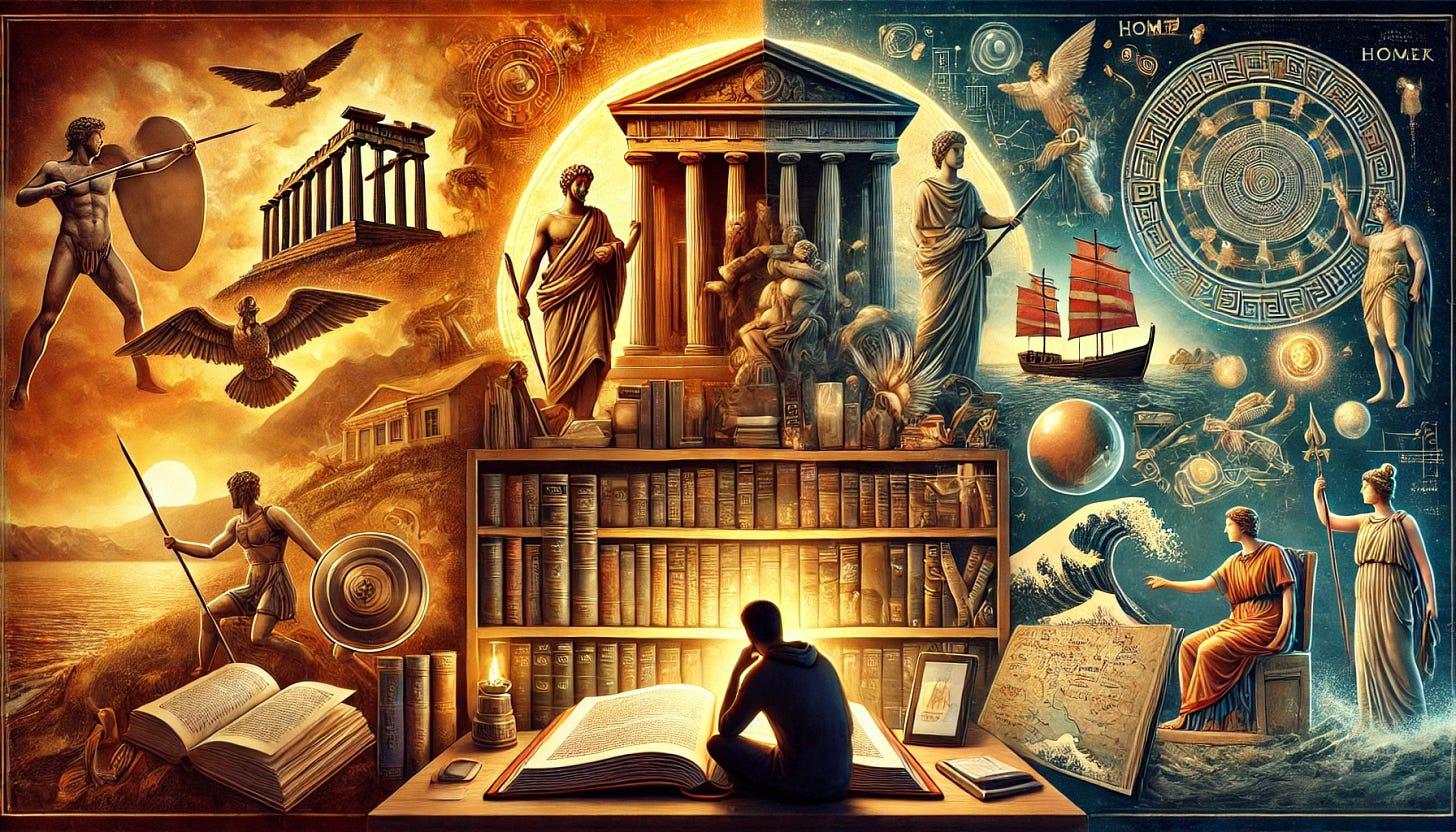Most of my reading is a buckshot affair. I follow my interests and whims where they go, from genetics to crime novels. But every year I try to have one unified reading project. In 2025, that was Homer.
The idea was simple and made up of three parts (1) re-read the Iliad and the Odyssey in the latest edition translated by Emily Wilson, (2) then read, or re-read, all the Homer related books I’d acquired over the years, and (3) then use Homer as a tool to dig deeper into the ancients and read all the other ancient Greek sources that feature the human characters from Homer.*
I’ve read Homer three times now. The first time was part of a study group in San Francisco in my early twenties that was focused on Joyce’s Ulyssess, but some of us read the Odyssey beforehand to better situated ourselves in what Joyce was doing. The group was led by a wonderfully eccentric, brilliant, only in SF dude who’d read the classics at St. Johns and had an enormous impact on how I think. (See my post on the importance of a private life for more on what Chris taught me).
I was way way out of my league. At the time I had pretentious of a life of the mind, but I’d gone to a not very good high school and then bummed around as an autodidact reading what I wanted, but never with much rigor. My reading of Homer then was cursory, just enough to have actually read it, not enough to have even begun to understand.
I read Homer again, years later, but really for the first time. While my first readings had been cursory, this one was more serious, with supplemental texts, and the whole nine yards. This was the reading that made me realize I’d be engaging with Homer for the rest of my life.
Of course there is also the cyclops, the sirens, and Gods intervening left and right. A young me was drawn in by these magical elements, but today it’s the through line of the man trying to return to his family, and his family trying to cope with his absence that resonates with me.
Perhaps this is why we’re still reading Homer, still translating him for new audiences, each book contains multiple readings (a magical tale of adventure for some, a dark homecoming tale of revenge for others) looking forward to what will come to the fore when I read it again someday.
This year, I read Homer for a third time. He’s starting to seem like an old friend. I know what’s coming when Hector goes to see his young son, and I get emotional in interpretation, wondering how this translation (Wilson this time) will treat this most delicate of scenes; or I read Odysseus slaughtering the suitors with a bit of guilty glee, glad he’s ridding his house of those trying to take his wife, but not without sympathy for young men caught up in the melee of youth.
What was new this time was adding on to Homer the other ancient works that build off his genius, and feature the other human characters from the Iliad. These stories, mostly tragedies, added more than I could have imagined to my understanding of a Greek world both familiar and extremely strange. There’s the horrible aftermath of war in the Trojan Women; the development of ideas of justice in Ajax, and the downright bizarre ret-conning of a central myth of Greece in Helen.
It was a deeply rewarding experience. As I’ve written elsewhere, the classics are strange. They have a structure and moral lessons that are different, and sometimes repugnant, but they touch on something extremely deep about what it means to be human, it’s worth the effort.
This coming year I’m building off this work with a project taking me a bit deeper into the ancients with more philosophy and history and fewer plays. Eventually, I’ll have read all of western literature, but its going to take awhile.
*Here’s the books I read for the project, capsule reviews can be found in my year end write up.
The Ancients
The Iliad, Homer (trans Emily Wilson)
The Odyssey, Homer (trans Emily Wilson)
Works and Days / Theogony, Hesiod
The Complete Sophocles Vol II (Elektra, Ajax, Women of Trachis, Philoctetes), Sophocles
The Complete Aeschylus Vol I (The Oresteia), Aeschylus
Iphigenia in Aulis, Helen, Iphigenia in Tauris, Euripides
Modern Interpretation and Retellings
War Music: An Account of Books 1-4 and 16-19 of Homer’s Iliad, Christopher Logue
Homer and His Iliad, Robin Lane Fox
War and the Iliad, Simone Weil and Rachel Bespaloff
The World of Odysseus, M.I. Finley
The War the Killed Achilles: The True Story of Homer’s Iliad, Caroline Alexander





I randomly decided to read the Odyssey in the summer of 2023. I happened to have just finished reading "Against the Grain: A Deep History of the Earliest States" by James Scott. It's about the formation of the Sumerian city-states and agriculture. Having that book in recent memory was very illuminating for the Odyssey's chapter on the island of the Cyclops.
The Cyclops were just hunter-gatherers, a society that was not controlled by a noble elite and harnessed for agriculture. Hunter-gatherers were labeled barbarians, and said to be horrible and lawless and evil, because farmers kept leaving their city-states and joining the barbarians. It was just a much better life. So the nobles created a lot of propaganda to say the barbarians were bad.
This is why the Odyssey repeatedly says the Cyclops were horrible (despite them not doing anything horrible), and repeatedly notes that they did not grow grain or wine. Without the background knowledge of early city-state labor politics, the text's fixation on the Cyclops' lack of grain would've been really random and weird, but it makes total sense in context.